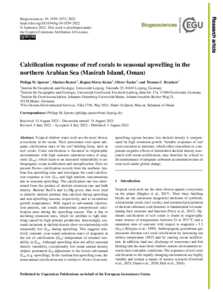وثيقة
Calcification response of reef corals to seasonal upwelling in the northern Arabian Sea (Masirah Island, Oman).
المعرف
DOI: 10.5194/bg-19-3559-2022
المصدر
Biogeosciences. v. 19, 15, p. 3559-3573
المساهمون
الدولة
Germany.
مكان النشر
Göttingen
الناشر
Copernicus GmbH.
ميلادي
2022-08-03
اللغة
الأنجليزية
الملخص الإنجليزي
Tropical shallow-water reefs are the most diverse ecosystems in the ocean. Their persistence rests upon adequate calcification rates of the reef building biota, such as reef corals. Coral calcification is favoured in oligotrophic environments with high seawater saturation states of aragonite (ωsw), which leads to an increased vulnerability to anthropogenic ocean acidification and eutrophication. Here we present Porites calcification records from the northern Arabian Sea upwelling zone and investigate the coral calcification response to low ωsw and high nutrient concentrations due to seasonal upwelling. The calcification rate was determined from the product of skeletal extension rate and bulk density. Skeletal Ba/Ca and Li/Mg proxy data were used to identify skeletal portions that calcified during upwelling and non-upwelling seasons, respectively, and to reconstruct growth temperatures. With regard to sub-annual calcification patterns, our results demonstrate compromised calcification rates during the upwelling season. This is due to declining extension rates, which we attribute to light dimming caused by high primary production. Interestingly, seasonal variations in skeletal density show no relationship with temporally low ωsw during upwelling. This suggests relatively constant, year-round saturation states of aragonite at the site of calcification (ωcf) independent of external variability in ωsw. Although upwelling does not affect seasonal density variability, exceptionally low mean annual density implies permanent ωcf adjustment to the lowest sub-annual ωsw (e.g. upwelling). In the Arabian Sea upwelling zone, the mean annual calcification rate is similar to Porites from non-upwelling regions because low skeletal density is compensated by high extension growth. Variable responses of reef coral extension to nutrients, which either exacerbate or compensate negative effects of diminished skeletal density associated with ocean acidification, may therefore be critical to the maintenance of adequate carbonate accumulation rates in coral reefs under global change.
ISSN
1726-4170
قالب العنصر
مقالات الدوريات

